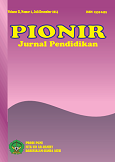THE INFLUENCE OF TEACHER’S PERSONALITY COMPETENCE ON THE LEARNING INTEREST OF CLASS VI STUDENTS AT SD NEGERI 3 KRASAK PECANGAAN JEPARA
DOI:
https://doi.org/10.22373/pjp.v13i2.25160Keywords:
Teacher Personality Competence, Interest In Learning.Abstract
The aim of this research is to determine the influence of teacher personality competence on the learning interest of class VI students at SD Negeri 3 Krasak Pecangaan Jepara. This research method uses a quantitative approach with an expost facto type of research. The data collection technique in this research uses questionnaires which are used to measure teachers' personality competencies and students' interest in learning. get results in a simple regression test, get a significance value of 0.004, this value is <0.05 or 0.004 <0.05. In the F-test, the results showed a significant value of 0.004 < 0.05 and looking at the calculated value Fcount >Ftable or 11.150 > 4.49, H0 was rejected and Ha was accepted. Then, the coefficient of determination test shows that the correlation value (R) is 0.653, and the coefficient of determination (R Square) is 0.426, which means that the influence of Teacher Personality Competence on Student Learning Interest is 42.6%. With this it can be concluded that the teacher's personality competence has an influence on students' interest in learning.
Keywords: Teacher Personality Competence, Interest in Learning.
References
Agustin, I. A. & N. (2019). Pengaruh Kompetensi Kepribadian Guru terhadap Pembentukan Karakter Siswa di SD Negeri Margorejo VI/524 Surabaya. Education and Human Development Journal, 4(2). https://doi.org/10.33086/ehdj.v5i1.1122
Aksin, A. (2023). Five-factor Personality Traits as Predictors of Intercultural Sensitivity among Turkish Preservice Teachers. Heliyon, 9(7). https://doi.org/10.1016/j.heliyon.2023.e17867
Anwar, M. (2018). Menjadi Guru Professional. Jakarta: Prenadamedia Group.
Asilah, J. (2023). Penerapan Media Puzzle untuk Meningkatkan Minat Belajar Siswa pada Mata Pelajaran PAI Kelas XI MIPA SMAN 1 Jenengan. Skripsi. IAIN Ponorogo.
Cahyani, I. D., Abdul, H. F., & Surya, S. F. (2023). Brain-Based Learning dalam Meningkatkan Kemampuan Berpikir Kritis Siswa SMP. Jurnal Inovasi Pembelajaran Matematika: PowerMathEdu (PME), 02(01). https://doi.org/10.31980/powermathedu.v2i1.2640
Darmadi. (2017). Pengembangan Model dan Metode Pembelajaran dalam Dinamika Belajar Siswa. Yogyakarta: Deepublish. https://books.google.co.id/books?id=MfomDwAAQBAJ
Fitria, Nofriyandi, Suripah, & Sthephani, A. (2023). Perangkat Pembelajaran Matematika Berbasis Problem-Based Learning pada materi Sistem Persamaan Linear Tiga Variabel. Jurnal Inovasi Pembelajaran Matematika: PowerMathEdu (PME), 02(01). https://doi.org/10.31980/powermathedu.v2i1.2366
Khusnah, W. (2020). Pengaruh Budaya Sekolah dan Kompetensi Kepribadian Guru terhadap Karakter Siswa Kelas V SD Dabin 1 Kecamatan Talang Kabupaten Tegal. Skripsi. Universitas Negeri Semarang.
Lestari, L., & Ekasatya, A. A. (2022). Kesalahan Siswa dalam Menyelesaikan Soal Cerita tentang Bangun Ruang Sisi Lengkung Menggunakan Prosedur Newman. Jurnal Inovasi Pembelajaran Matematika: PowerMathEdu, 1(2). https://doi.org/10.31980/powermathedu.v1i2.2225
Mahardika, D. A., Gumilar, A. C., & Retnaningrum, E. (2022). Model Pembelajaran Somatic, Auditory, Visual, Intellectual untuk Kemampuan Pemahaman Matematis Siswa SMK. Plusminus: Jurnal Pendidikan Matematika, 2(3). https://doi.org/10.31980/plusminus.v2i3.2027.
Nisa, K., Susongko, P., & Utami, W. B. (2017). Penyusunan Skala Minat Belajar Matematika dengan Penerapan Model Rasch (Studi Pengembangan Pada Pembelajaran Matematika Kelas VII di SMP Negeri 1 Tarub tahun ajaran 2016/2017). JPMP (Jurnal Pendidikan MIPA Pancasakti), 1(1). https://doi.org/10.24905/jpmp.v1i1.789
Putra, R. G. (2021). Implementasi Kompetensi Pedagogik Dan Kepribadian Guru dalam Penguatan Pendidikan Karakter Disiplin pada Peserta Didik. Jurnal Genta Mulia, XII(1). http://eprints.untirta.ac.id/id/eprint/14949.
Rudianti, R., Aripin, & Dedi, M. (2021). Proses Berpikir Kritis Matematis Siswa Ditinjau dari Tipe Kepribadian Ekstrovert dan Introvert. Mosharafa: Jurnal Pendidikan Matematika, 10(3). https://doi.org/10.31980/mosharafa.v10i3.1038
Satriyawan, A. N., & Kamilia, L. (2024). Correlation of Interests With Career Motivation Continue Your Studies To Higher College Reviewed From Modern Teaching. Pionir: Jurnal Pendidikan, 13 (1). https://doi.org/10.22373/pjp.v13i1.22213
Siahaya, A. (2024). Teacher Professionalism as a Key Factor in Creating. International Journal of Teaching and Learning (INJOTEL), 2(2).
Thoyyibah, D., Attalina, S. N. C., & Widiyono, A. (2022). Pengaruh Kompetensi Kepribadian Guru Terhadap Pembentukan Karakter Disiplin Siswa Kelas IV SDN 01 Bugel Kedung Jepara di Era New Normal. Jurnal Pendidikan dan Konseling, 4(3).
Trismayanti, S. (2019). Strategi Guru dalam Meningkatkan Minat Belajar Peserta Didik di Sekolah Dasar. Al-Ishlah: Jurnal Pendidikan Islam, 17(2).
https://doi.org/https://doi.org/10.35905/alishlah.v17i2.1045
Widiyono, A., Thoyyibah, D., Nasir, A. H. K., & Hidayatullah, M. L. (2019). Pengaruh Reward dan Punishment terhadap Hasil Belajar Matematika Peserta Didik Kelas IV SDUT Bumi Kartini Jepara. Jurnal Pendidikan Dasar : Jurnal Tunas Nusantara, 1(2). https://doi.org/10.34001/jtn.v1i2.1461
Downloads
Published
Issue
Section
License
- Authors retain copyright and grant the journal right of first publication with the work simultaneously licensed under a Creative Commons Attribution License that allows others to share the work with an acknowledgment of the work's authorship and initial publication in this journal.
- Authors are able to enter into separate, additional contractual arrangements for the non-exclusive distribution of the journal's published version of the work (e.g., post it to an institutional repository or publish it in a book), with an acknowledgment of its initial publication in this journal.
- Authors are permitted and encouraged to post their work online (e.g., in institutional repositories or on their website) prior to and during the submission process, as it can lead to productive exchanges, as well as earlier and greater citation of published work (See The Effect of Open Access).

